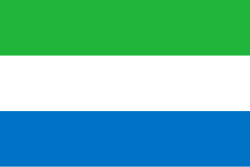Human rights in Sierra Leone

Human rights in Sierra Leone are very bad in Sierra Leone. They have improved slowly since the end of its civil war in 2002. Among the major human-rights problems in Sierra Leone are "security force abuse and use of force with detainees, including children; conditions in prisons and jails; people being arrested without reason; long detention, excessive bail, and bad legal representation; interference with freedom of speech and press; using force against demonstrators; corruption; discrimination and violence against women, discrimination based on sexual orientation; female genital mutilation (FGM); child abuse; human trafficking, including children; and forced child labor".[1]
Sierra Leone has agreed to or ratified the International Covenant on Civil and Political Rights (ICCPR), the Convention Against Torture and Other Cruel, Inhuman and Degrading Treatment or Punishment, the Convention on the Elimination of All Forms of Discrimination against Women, and the African Charter on Human and Peoples' Rights.[2]
In September 2011, Sierra Leone's First UPR Report was adopted by the UN Human Rights Council (HRC) in Geneva. Of the 129 recommendations made by the review committee on 5 May 2011, the government of Sierra Leone said that it had already implemented 57.[3]
In November 2012, Sierra Leone was elected to the U.N. Human Rights Council.[4]
LGBT
[change | change source]Male homosexuality is illegal but female is not. People who are known to be gay suffer social discrimination. There are secret LGBT support groups in the country. Lesbians are often raped. These rapes are often planned by their families with the intention of "turning them straight".[1]
References
[change | change source]- ↑ 1.0 1.1 "2010 Human Rights Report: Sierra Leone". US State Department. Retrieved January 12, 2013.
- ↑ "Sierra Leone" (PDF). International Centre for Transitional Justice. Archived from the original (PDF) on August 4, 2012. Retrieved January 12, 2013.
- ↑ "Human Rights in the Administration of Justice" (PDF). The State of Human Rights in Sierra Leone. Archived from the original (PDF) on March 4, 2016. Retrieved January 12, 2013.
- ↑ "Sierra Leone Elected Member At the UN Human Rights Council". allAfrica. Retrieved January 12, 2013.